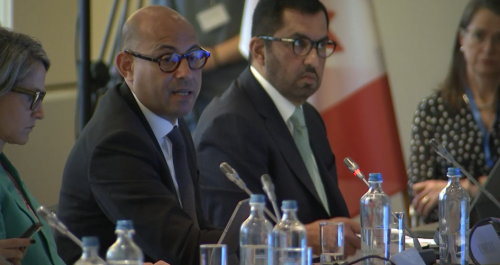
https://unfccc.int/news/simon-stiell-dr-sultan-al-jaber-leadership-by-th...
With only 125 days to go, we must use every opportunity between now and COP28 to align action and political will going forward towards the common goal of closing the gaps across all of the pillars of the Paris Agreement and get on track to keep 1.5⁰C within reach.
The G20 is responsible for 85% of the world’s GDP, but also 80% of the world’s emissions. Leadership by the G20 is indispensable to enable an inclusive and ambitious development agenda that demonstrates to the world that the transformation towards a net-zero and climate resilient world comes with great benefits for growth, poverty eradication and sustainable development.
While the discussions at the G20 Energy Ministerial considered energy transition and aligning current pathways with the Paris Goals, the outcome did not provide a sufficiently clear signal for transforming global energy systems, scaling up renewable and clean energy sources and responsibly phasing down fossil fuels.
This year, more than ever, unity is a prerequisite for success. Globally, the world has experienced its hottest summer on record, climate change continues to impact people every day, particularly the climate vulnerable, and they are looking to us to take decisive action.
The signal we send for the conclusion of the first ever Global Stocktake at COP28 will be crucial. This cannot only look backwards, but should also set out a collective pathway going forward. A commitment to more ambitious action, across all pillars of the Paris Agreement, is needed to ensure a credible response to the GST and to strengthen the integrity of the multilateral process under the UNFCCC as a whole.
The science demands a strong mitigation outcome at COP28 that drives a significant reduction in greenhouse gas emissions and builds on the progress of previous COPs. We call on the G20 to lead the way on the basis of both science and equity, laying the path to a strong and credible outcome that provides developing countries with the basis to undertake a just transition.
Together, we must take necessary steps to accelerate our inevitable decarbonization in a responsible manner, while enabling energy access for all, promoting sustainable development and supporting just transition. Tripling global renewable energy capacity and doubling the rate of energy efficiency improvements across sectors by 2030, including ramping up electrification and enhanced cooling approaches, is critical to enable this.
We must not only address supply, but also demand, in particular transforming heavy emitting sectors.
It is our hope that any progress achieved by the G20 drives strong outcomes at COP28 under the Global Stocktake and capitalizes on the Just Transition Work Programme established at COP27 to ensure that this transition is fair, leaves no one behind and supports the broad development challenges faced by developing countries in launching this transition, which should address the transformations needed under both the mitigation and adaptation agendas.
A credible response should be underpinned by clear and tangible outcomes on adaptation, where the impacts on lives and livelihoods demand clear action. Even at 1.2⁰C, we have seen the increasing impacts of climate change every day, but without an adequate global response to address them.
The Paris Agreement enshrines a warming limit which is publicly accepted. But we also set ourselves the task of defining a Global Goal on Adaptation (GGA) and operationalizing the loss and damage fund and funding arrangements. We need the G20 to ensure that the human face of the climate crisis is at the center of all its decision making. This includes a GGA Framework that elaborates the vision for a landing zone for global resilience, as well as the means to assess progress towards this landing zone, while pinpointing the necessary adaptation action globally, and what strengthened adaptation finance must support, including the urgent commitment to double adaptation finance.
As the IPCC has set out, some of the impacts of climate change go beyond viable adaptation. It is absolutely clear that COP28 must deliver on the promises on loss and damage made in Sharm-El- Sheikh. The G20 must affirm its commitment to achieve the operationalization of the fund and funding arrangements. Those at the frontline of climate change need our support now, not in 5 years’ time. This is the benchmark for ambition.
Whether we can deliver on a truly ambitious agenda that fills the gaps to 2030 will depend on our ability make climate finance available, affordable and accessible to developing countries. Climate finance arrangements will need to be transformed to deliver at the necessary scale, to work better as a system and to support private finance mobilization at unprecedented levels. Commitments made must be delivered upon, including on the $100 billion, adaptation finance doubling and the forthcoming GCF replenishment. G20 countries must also demonstrate leadership in actively aligning financial flows to the Paris Agreement through the multilateral development banks and other avenues.
We must leave Chennai on the right path and with a clear signal that the political will to tackle the climate crisis is there. Every meeting counts, every outcome must bring us closer. COP28 will bring countries together to deliver the way forward on climate action, commitments on mitigation, adaptation and finance will need to be revised, to be in line with delivering on the Paris Agreement. The world needs its leaders to unite, act and deliver; and that must start with the G20.










Add new comment